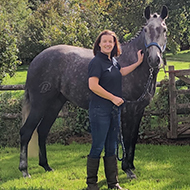
Dr Gillian Tabor is the first recipient of a Hartpury University /UWE partnership doctorate.
Hartpury University academic Dr Gillian Tabor has become the first-ever recipient of a Hartpury University/University of the West of England partnership doctorate for research related to veterinary physiotherapy.
Dr Tabor, who is a member of the Association of Chartered Physiotherapists in Animal Therapy (ACPAT), received the honour for her paper entitled: ‘The use of objective measurement in Veterinary Physiotherapy’.
Dr Tabor commented: “Thirty years ago, a physiotherapist treated my pony. The next time I rode, I could feel the difference and I decided at that point I wanted to become an animal physiotherapist.
“My gratitude goes to my teachers, lecturers, human patients, owners and of course all the horses and ponies I've been lucky enough to meet on my journey to the point where I am now. I feel I have landed on my feet with my current job at Hartpury University because I am able to combine passions of teaching new generations of veterinary physiotherapists with investigating just what makes our job so great.
“My colleagues are so enthusiastic about their subjects and have given me the conviction to pursue my research, continue to learn and to try to be the best for my students.”
Dr Tabor specialises in physiotheraphy for horses and riders, focussing on treatment and rehabilitation of competition horses, while also undertaking research and supervising students.
Rosie Scott-Ward, Pro Vice-Chancellor at Hartpury University, said: “I would like to take this opportunity to congratulate Gillian on becoming the first recipient of a Hartpury University /UWE partnership doctorate.
“Gillian has managed to complete this while working part-time for Hartpury, sustaining her own practice, commuting from Devon and more recently balancing COVID-19 restrictions and home schooling.
“It’s an incredible achievement for Gillian and a very proud moment for Hartpury University.”
Image (C) Hartpury University.



 The veterinary mental health charity Vetlife is inviting the veterinary community to join it for a sponsored cold-water dip.
The veterinary mental health charity Vetlife is inviting the veterinary community to join it for a sponsored cold-water dip.